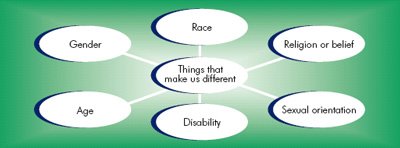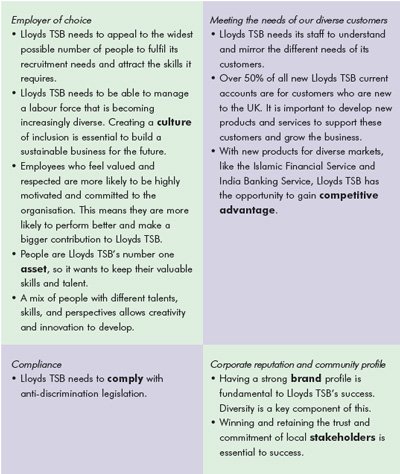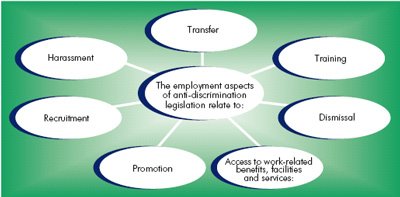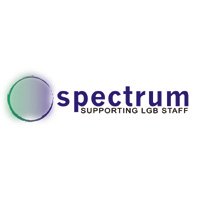
Differences can come from individual characteristics and life experiences, such as where you went to school or where you live. Being married or in a civil partnership, being a parent, your political affiliation, career path or level of income can also influence your personal perspectives. These factors make us react, approach challenges and solve problems differently. Diversity describes people’s differences. When people refer to ‘diversity’, especially in a business context, they often focus on a particular set of key characteristics or differences. These are:
gender
ethnicity (which refers to colour, race and national origin)
religion
disability
age
sexual orientation.
These differences are protected by law. This means staff and customers have the legal right to be treated fairly and equally in relation to these characteristics.
The benefits of diversity
Diversity brings real benefits to society and businesses. For society, diversity brings richness and variety. There are always new and interesting things to be learnt from each other.

For a business, employing a diverse workforce enables it to use a wider range of talents and skills. These lead to creativity and innovation. Businesses need to mirror the communities and cultures they work in so they can understand and anticipate the diverse needs of their customers.
In order to get the best from staff and meet the varying needs of their diverse customers, it is very important for businesses to ‘manage diversity’ in a positive way. They need to recognise, respect and value people’s differences.
Diversity in the UK
The following facts help to show how diverse society is becoming:
- Ethnic minorities make up 8% of the external labour market (4.6 million people).
- The UK population is becoming older. By 2016 there will be more adults aged 45-59 than any other age group.
- 6% of the adult population is estimated to be lesbian, gay, or bisexual (3.5 million people).
- 11% of the UK working age population is estimated to have a disability.
- Women currently account for 51% of the working population.
- By 2011, it is estimated that only 20% of the UK workforce will be white, non-disabled men aged under 45.
This case study shows how Lloyds TSB has created an environment in which different characteristics are positively welcomed and valued. It specifically focuses on how the bank has developed and is using a sexual orientation strategy to improve its business performance.
The business case for diversity

Lloyds TSB believes that its diversity programme is essential to keeping its position as a leading-edge employer. The programme helps Lloyds TSB maintain its first-class brand reputation and the opportunity to maximise its market share. Lloyds TSB’s business case for diversity focuses on 4 key areas:
Employment legislation and diversity
It is unlawful to discriminate on grounds of sexual orientation and religion or other belief.
Over the years, the government has created laws to provide a framework between employers and employees. A number of these laws relate to diversity in the workplace. These are designed to make sure everyone has the same opportunities. These laws set the minimum standards that businesses must comply with.
National legislation

Some laws are created at national level by UK Parliament. For example, the Sex Discrimination Act 1975 (SDA) makes it illegal to discriminate because of an individual’s sex, gender reassignment, being married or in a civil partnership. It covers many areas including employment, vocational training, education, the provision and sale of goods, facilities and services, and premises.
Businesses must also comply with the Civil Partnership Act (2004) which came into force on 5th December 2005. Civil partnership is a new legal relationship. It can be registered by two people of the same sex who are over 16 years of age. It means same sex couples can obtain legal recognition for their relationship and gives them the right to be treated in the same way as married couples. This covers a wide range of legal matters including:
- next-of-kin rights, including benefiting under a partner’s will without having to pay inheritance tax
- assessment for tax purposes, child support or income-related benefits
- employment and pension benefits
- recognition for immigration and nationality purposes.
International legislation
At a higher level, laws are created by the European Union for all member countries.
Good employers obey the law. The best employers go further than this and recognise how diversity can benefit the business. For example, the European Union Equal Treatment Directive makes it unlawful to discriminate on grounds of sexual orientation and religion or other belief. Sexual orientation is an orientation towards persons of the same sex (lesbians or gay men), towards a person of the opposite sex (heterosexual) or towards persons of the same sex and the opposite sex (bisexual). The Sexual Orientation Regulations provide protection from discrimination based on an individual’s sexual orientation. An individual who has been treated less favourably than another because of their sexual orientation has the right to make a legal complaint.
Lloyds TSB´s sexual orientation strategy

Lloyds TSB takes diversity very seriously.
The Group’s Deputy Group Chief Executive has overall responsibility for its diversity strategy. This includes seven main strands: gender, race and religion or belief, disability, sexual orientation, age and work-life balance. Lloyds TSB believes diversity is important because employing and managing diverse people makes it more well-rounded and balanced. It enables Lloyds TSB to be more adaptable to new situations.
Sexual orientation strategy
Sexual orientation is the most recent of these diversity strands. Lloyds TSB launched its sexual orientation strategy in 2005. This was done after research to help the organisation understand attitudes within Lloyds TSB towards sexual orientation at work. A survey was conducted with over 850 staff. The research revealed that lesbian, gay and bisexual (LGB) staff can sometimes feel isolated. This occurs where they are unable to see other people like themselves, either within their immediate work environment or in management positions, who can act as role models.
Lloyds TSB is committed to making sure that employees who are LGB can be comfortable being open about their sexual orientation at work. This is important because research shows that people are likely to perform better when they can be themselves.
How Lloyds TSB implements the strategy
Following the research, the Group’s Equality & Diversity department set up a working group of LGB staff, who have helped to develop the company’s sexual orientation strategy. This has led to a programme of activities to provide the right support and culture so LGB staff can reach their full potential.
The strategy includes a very active network for LGB staff, called Spectrum. The network is run by volunteers and provides LGB staff with the opportunity to:
- meet and talk with others from similar backgrounds/circumstances
- share experiences and issues in a supportive environment
- focus on their own development
- find role models and mentors (from similar backgrounds to themselves) who may not always be visible in the workplace.
Mentoring is an important part of Lloyds TSB’s strategy for developing employees in the workplace. It involves an employee being teamed up with a more experienced employee. This practice is widely used in businesses. The ‘mentor’ acts as a role model, guide and supporter for the ‘mentee’. The ‘mentee’ is given advice and help about work-related issues and wider concerns by the ‘mentor’. In addition to Spectrum, Lloyds TSB has put in place a number of other measures to support LGB staff, including a mentoring database. This allows staff to search for a mentor who is of the same sexual orientation or who has an interest in LGB issues.
How does Lloyds TSB communicate its diversity strategy?

Lloyds TSB believes that staff perform best in an environment that is inclusive, open, flexible and fair.
Lloyds TSB has put in place support measures to help LGB staff reach their full potential. It has also focused on creating an environment which respects and values difference.
Lloyds TSB’s communication programme
Lloyds TSB has developed a detailed communications programme to ensure that sexual orientation becomes a visible and high profile part of the Group’s wider Equality & Diversity Strategy.
- A news feature about a relevant aspect of the Group’s sexual orientation strategy is published most months. These are often introduced by Lloyds TSB’s most senior managers. This ensures sexual orientation is treated as a serious business issue and opportunity.
- Lloyds TSB also sponsors external LGB initiatives to raise the organisation’s profile with the LGB community. This positions the Group as the bank and employer of choice for LGB people.

Training and awareness
Lloyds TSB also provides a range of training courses and development tools to ensure staff understand diversity and why it is essential for the company’s success. This helps raise awareness at every level of the organisation.
- All Lloyds TSB staff are expected to complete a multi-media training package called ‘Diversity Achieving Success Through Valuing Difference’. This is provided online or as a CD-Rom. The package describes what sexual orientation is and highlights its relevance to staff and customers.
- The Equality and Diversity Team also offers two intensive face-to-face management training programmes to raise awareness and understanding of diversity and the benefits of adopting a progressive diversity strategy as both an employer and service provider. These give senior and middle managers the opportunity to identify and practice the skills needed to positively manage difference.
Conclusion

Equality and diversity are not just legal issues or something which is socially desirable, they are essential to competitive advantage. In an ever-tightening employment market, companies need to differentiate themselves as an employer of choice to ensure that they attract and keep the best cross-section of talent.
Lloyds TSB is keen to get closer to its customers, to understand their needs better and provide them with the right products and services. The Group believes that with a diverse workforce it will be better placed to understand the needs of all its customers. It will be able to explore the opportunities available across diverse communities.
